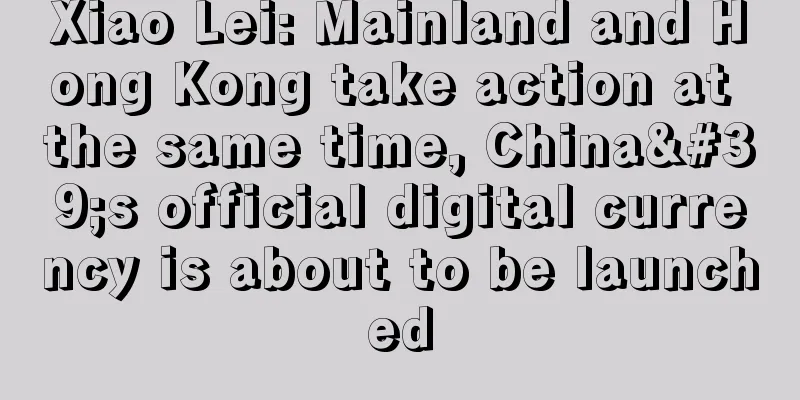Xiao Lei: Mainland and Hong Kong take action at the same time, China's official digital currency is about to be launched

|
These two days are memorable days for the digital currency field. In particular, on November 6, eight pieces of news were released simultaneously in the blockchain and digital currency markets:
The above eight pieces of news were all released at the same time. I am not here to interpret the news for you, but to tell you that this shows that China already has a clear development idea and execution logic for blockchain and digital currency, and has begun to implement it in a centralized manner. From these eight pieces of information, I have summarized several important points for everyone to learn and refer to. From this, we can see that this is the specific division of labor and implementation after the Politburo collectively studied blockchain and put forward the vision for blockchain development, and then various government departments conducted detailed research and planning. The division of labor is manifested at two levels. One level is the strategic division of labor, namely: the mainland focuses on developing the combination of blockchain and the real economy, and providing various public opinions and technical guarantees for the issuance of official digital currency; Hong Kong focuses on developing digital currency transactions and blockchain financial settlements. Another level is the coordination and implementation between Hong Kong and the Mainland, between departments, and between enterprises. For example, the specific division of labor and cooperation between the Mainland and Hong Kong, the industrial planning adjustment of the National Development and Reform Commission, and the specific work direction of the Ministry of Industry and Information Technology; for example, the cooperation between the central bank and Huawei, and the strategic cooperation between the central bank and the Hong Kong Monetary Authority. Let’s look at the mainland first. The NDRC can be said to hold the power of life and death over the development of China's industry, so the NDRC's "attitude" is very important to the blockchain industry. To develop blockchain, it must be the development of the entire industry chain. Since blockchain has become a strategic emerging industry, "mining" based on providing upstream computing power to blockchain operation is no longer an "eliminable industry." Don't misunderstand this as encouragement for Bitcoin mining. In fact, it is mainly based on the development of the entire blockchain. In the future, the blockchain operation of many physical enterprises may need "mining" to support it. The Ministry of Industry and Information Technology focuses on implementing the overall nature and execution goals of the blockchain industry. That is, not only should there be unified domestic standards, but also the development ideas that will affect international standards in the future should be considered. Therefore, it is necessary to propose implementation details and goals. Therefore, a special department needs to be established to coordinate the entire industry. In fact, blockchain is regarded as a major industry, similar to the formulation of standards for the automotive industry, the Internet, and 5G communications. The central bank's goal is even clearer. Vice Governor Fan Yifei, who is in charge of payment settlement and digital currency, went directly to talk to Huawei and signed the contract. Although the details were not disclosed, judging from the signing ceremony and the background board, this is aimed at the future issuance of China's official digital currency. China's official digital currency must first be based on mobile payments, which are inseparable from mobile phones. Huawei has huge advantages in mobile terminals and operating databases. Once the legal digital currency is issued, Huawei phones may support digital currency wallets at the first time. Although China's legal digital currency adopts a two-tier architecture, that is, the central bank gives it to banks and banks give it to users, the overall upper-level database is still controlled by the central bank. The central bank must establish partners from the top-level design field. This will pave the way for banks to directly issue digital currencies in the future. Otherwise, banks will have to negotiate with various mobile phone manufacturers themselves. At the same time as the central bank signed an agreement with Huawei, Ren Zhengfei suddenly said during a conversation, "Blockchain is worthless in front of quantum computing." If this sentence is taken out alone, it is very problematic. Is Ren Zhengfei denying the central bank's digital currency? In fact, if you go back to the context of the conversation at that time, you will find that Ren Zhengfei was actually promoting legal digital currency. Ren Zhengfei basically expressed his views on digital currency on purpose, not because he was asked. The host's question was, "Will you deny that Huawei equipment has backdoors?" In answering this question, Ren Zhengfei said that information security issues are always a big problem, just like the relationship between a spear and a shield, where there is a shield there must be a spear; but after the emergence of quantum computers, many computing problems can be solved; many people talk about how great blockchain is, but it is worthless in front of quantum computing. " Ren Zhengfei's more important answer is the next sentence. He said, "For example, the problem of counterfeit currency. Under the majesty of the law, counterfeit currency cannot be circulated. Therefore, information security must also be protected by law." Let me tell you Ren Zhengfei’s real logic. What he means is that there is no absolute information and data security. Technologies such as blockchain and digital currency can be easily hacked by quantum computers. Therefore, the issue of security mainly depends on the law. Therefore, whether blockchain and digital currency are reliable depends on the majesty of the law, not the security of technology. So anyone with a little bit of intelligence should understand what Ren Zhengfei is saying. In fact, he is affirming legal digital currency, because technology is only a way of implementation. Legal currency relies on the law. If you choose non-legal digital currency, you will face the problem of being classified as counterfeit currency. The consequence is what he said. Under the majesty of the law, counterfeit currency cannot circulate, and technology is threatened by quantum computing. In other words, everyone is advised to hold legal digital currency. Ren Zhengfei's "irrelevant answer" revealed a very important message. The background of this information may be that although the central bank's digital currency department has just signed a contract with Huawei, the central bank should have had in-depth communication with Huawei before that. The central bank should have popularized to Huawei how to define currency, how to define digital currency, how to understand the real difference between legal digital currency and other digital currencies from a legal perspective, etc. Ren Zhengfei basically understood all of this thoroughly. If this issue is not thoroughly understood, how could the central bank sign a contract with Huawei? At the same time, Mu Changchun, who is specifically responsible for the research on the central bank's digital currency technology and implementation plan, also conveyed a new message about the central bank's legal digital currency in Hong Kong. This reflects two points. One is that the central bank is now very eager to launch China's official digital currency as soon as possible. Because according to Mu Changchun, they believe that "in the future, in the process of issuing digital currencies in various countries, it will be a horse racing method, and the leader will take the entire market; whoever is more efficient and can better serve the public will survive in the future; if a leader takes the lead, the technology they use will be adopted by other parties." The meaning is very clear. If the People's Bank of China issues and serves the market first, then the technology of China's digital currency will be the standard and leader of the entire global digital currency industry. Conversely, if the United States or Facebook's Libra is issued first, then the US standard may lead in the future. In addition, Mu Changchun also mentioned the two-tier structure, which I won’t elaborate on, that is, the channel for issuing digital currency in the future is banks, not the central bank. But one thing that must be said is that “tourists” can also obtain legal digital currency wallets and use rights, which is very interesting. It is similar to registering a digital currency wallet, which may only require you to obtain your WeChat avatar or create an anonymous ID, and you will have an anonymous digital currency wallet, which can be used for transfers and retail payments. After talking about China, let’s take a look at Hong Kong. This time, the central bank not only released information about legal digital currency in Hong Kong, but also signed an agreement with the Hong Kong Monetary Authority on the use of blockchain settlement technology in the financial and trade fields. At the same time, the Hong Kong Securities and Futures Commission issued regulatory rules for virtual asset exchanges. This is no coincidence. Mu Changchun introduced the specific implementation methods of China's official digital currency in Hong Kong, and the central bank signed a strategic agreement with Hong Kong financial institutions. At the same time, the Hong Kong Securities Regulatory Commission issued regulatory rules for virtual asset exchanges. This is definitely not a coincidence. This is another layout of China in the field of blockchain digital currency. That is, Hong Kong's important role in this field has become clear. So what exactly will Hong Kong do? First of all, China's official digital currency is issued to users by banks, and "visitors" can obtain accounts and digital currency. This means that Hong Kong may become the largest offshore issuance and trading market for China's digital currency, thereby driving the internationalization of the RMB digital currency. Secondly, the more important strategy lies in the regulatory details of virtual asset exchanges issued by the Hong Kong Securities and Futures Commission. Many people may not understand what this detail means. I have summarized three aspects for you. First, the attitude of the Hong Kong Securities and Futures Commission may be the attitude of the entire China towards digital currency transactions, and it is also a kind of bottom line. It is clearly stated that the Hong Kong Securities and Futures Commission will issue licenses to qualified digital currency exchanges, but currently none of them are qualified. Because as long as these exchanges launch a digital currency defined as a security, they will be considered as securities trading providers, and will be an illegal existence before being included in the scope of securities supervision. Secondly, the Hong Kong Securities and Futures Commission believes that Bitcoin is not a security, so if there is an exchange that only provides trading of non-securities tokens such as Bitcoin, and does not trade in futures but spot trading, and meets several important conditions, it can obtain a license. For example, customer suitability management, only providing services to professional investors, meeting all requirements for fund supervision, such as anti-money laundering, KYC, and trusted custody of assets, and then ensuring that 98% of customers' virtual assets are stored in cold wallets, and that hot wallets store no more than 2% of assets. Thirdly, all futures businesses related to digital currencies in the market are illegal, and Hong Kong will not issue licenses for such transactions in the future. This is easy to understand, because futures are securities, and securities trading must be provided by designated exchanges in any country and subject to strict supervision. I personally very much agree with Hong Kong's attitude and approach. Given the transactions and futures products currently provided by these digital currency exchanges, it is impossible for them to exist "self-disciplined" in the long term, which is not in line with the logic of market development. I saw a piece of information a while ago. A user had a conflict with the leader of a certain exchange. Then the exchange directly blocked the user's account and transferred the digital currency. This kind of thing is not a question of who is right or wrong, but an unimaginable problem. It's like I went to the bank to do business and had an argument with the president, and then the president transferred the money in my bank. It's also similar to me going to a securities company and having an argument with the boss of the securities company. As a result, the securities company sold the stocks in my stock account and transferred the money. Think about it, what kind of problem is this? But in the cryptocurrency circle, everyone is just watching the fun. Most people will be attracted by a few subjective remarks and start to discuss who is right and who is wrong. This is the most terrible thing, which is unimaginably terrible. Therefore, I personally think that futures, perpetual contracts, etc. are a kind of private gambling method (similar to underground casinos). Providers can cheat and be the banker infinitely, and investors are just attracted by the eternal gambler mentality. No one will think about what the future will be like, because not many people who enter the casino have self-awareness. Therefore, the regulatory details of the Hong Kong Securities and Futures Commission are not harsh, but just a common sense arrangement. There are three possibilities for the future. Will the existing futures exchanges and stock exchanges in Hong Kong launch official Bitcoin futures contracts? Will Bitcoin transactions in the Hong Kong market be denominated in the legal digital currency of the People's Bank of China, which will make settlement very convenient? These are all worth looking forward to. Finally, let’s talk about China’s competitor in the digital currency field, the U.S. central bank, the Federal Reserve. At the same time, the Federal Reserve announced that it would look for a new manager for its retail payments department, who would also be responsible for researching digital currencies, stablecoins, distributed ledger technology, and a wide range of financial/digital innovations in the retail payments sector. The Federal Reserve is willing to pay him a maximum annual salary of $250,700, equivalent to RMB 1.75 million. It should be noted that the Federal Reserve is very conservative and rational in its focus on financial innovation, and the start of recruiting personnel in this area shows that the Federal Reserve already has a relevant action plan. In 2010, former Federal Reserve Chairman Paul Volcker said a classic saying: "The only useful invention in the banking industry is the ATM." In fact, the development of the US financial industry is more in the field of international rules and the creation of financial derivatives. The innovations used to change the overall underlying architecture, such as specific business and terminal transaction payments, have not changed for hundreds of years. From this perspective, the invention of the ATM has indeed changed the model of bank counter business. So if ATMs are a historic innovation, digital currency will be a further disruptor. ATMs are merely unmanned, while digital currency operates without a center (specific settlement institution). The People's Bank of China was the first to notice this, and the Federal Reserve has also begun to act. The People's Bank of China publicly recruited digital currency researchers in 2016. Three years later, the People's Bank of China has made all preparations to issue digital currency. The Fed's public recruitment this time means that the central banks of the world's first and second largest economies have begun to intervene in the field of digital currency from a strategic level. |
>>: Retail miners are feeling miserable: Where is the promised decentralization?
Recommend
Are women with prominent brow bones selfish and quite snobbish?
People with this kind of brow bones are more powe...
Judging people's personality and business strategies from the width between their eyes
① A person with a wide distance between the eyes ...
The boy with the ears turned upside down has a face that shows he is a traitor.
In Chinese physiognomy culture, there is a type o...
Is it good for a woman to have a mole on her clavicle?
What is the sexiest part of a woman's body? L...
Several Kinds of Noble Fates in Bone Physiognomy
Whether it is bone weighing, face reading, or hor...
Are ghosts most afraid of a broken palm? What are the characteristics of a man with a broken palm?
Some people may have heard that ghosts are most af...
Which "digital currencies" can survive this cold winter?
Recently, some readers have asked me what I think...
Facial features of people who lack patience
Sometimes patience is really an important thing. ...
Are children with long wisdom lines smart? How does the wisdom line predict destiny?
The length of the lines on each person’s palm is d...
Look at the other person to see if they love you
Look at the other person to see if they love you ...
How does a woman with a short forehead look like?
There are many types of forehead features, and th...
Does leaky teeth really lead to loss of money?
Everyone yearns for a set of neat and white teeth...
The activation of segregated witness by altcoins drives the price up sharply. Litecoin wants to help Bitcoin break the deadlock in expansion.
Golden Finance News - On April 26, the latest dat...
What kind of face can tell the second marriage?
We all hope that our marriage will last a lifetim...
How to read a man's facial features
The study of facial features has a history of tho...









